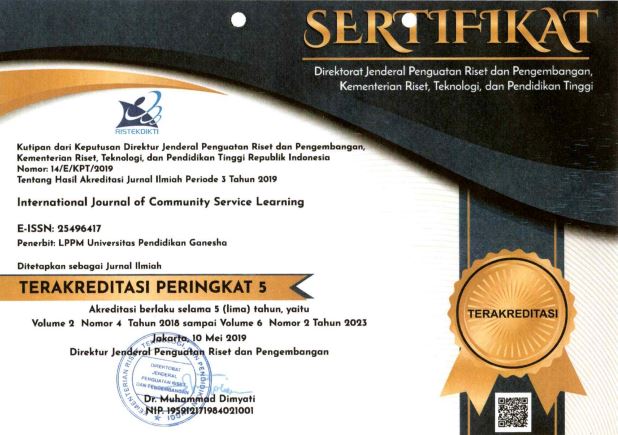Evaluation of The Success of Using a SAP-Based ERP System With Theory of Planned Behavior (TPB) Model
DOI:
https://doi.org/10.23887/ijcsl.v8i1.75780Keywords:
SAP, Theory of Planned Behavior, SmartPLSAbstract
PT. XYZ has implemented System Application and Product in data processing (SAP) software to support business processes in the company. The success or failure of system implementation can be assessed from non-technical aspects, namely that users can accept and use the SAP system well. The aim of this research is to evaluate the use of SAP software through Theory of Planned Behavior (TPB) modeling. Attitudes, subjective norms, perceived behavioral control, behavioral intentions, and behavior are the variables used in this modeling. This TPB modeling explains the factors that influence an individual's interest and behavior in using SAP software. An individual's intention to use SAP software is influenced by attitudinal variables, perceived behavioral control, and subjective norms, while a person's influence to use SAP software is influenced by intention. This type of research is quantitative research through data collection using a questionnaire with 30 respondents coming from SAP users at PT. XYZ. Data analysis was carried out using the SmartPLS application. The results obtained are that attitudes have a positive and significant effect on behavioral intentions, behavioral intentions have a positive and significant effect on behavior, subjective norms have a positive and significant effect on behavioral intentions, and perceived behavioral control has a negative effect on behavioral intentions in using SAP software.
References
Afdalia, N., Pontoh, G. T., & Kartini, K. (2014). Theory of planned behavior dan readiness for change dalam memprediksi niat implementasi peraturan pemerintah nomor 71 tahun 2010. Jurnal Akuntansi & Auditing Indonesia, 18(2), 110–123. https://doi.org/10.20885/jaai.vol18.iss2.art3. DOI: https://doi.org/10.20885/jaai.vol18.iss2.art3
Afrianto, H. N. (2022). Faktor-Faktor Yang Mempengaruhi Mahasiswa Untuk Mengikuti Erpsim. 1–115.
Al-Jabri, I. M., & Roztocki, N. (2015). Adoption of ERP systems: Does information transparency matter? Telematics and Informatics, 32(2), 164–179. https://doi.org/https://doi.org/10.1016/j.tele.2014.09.005. DOI: https://doi.org/10.1016/j.tele.2014.09.005
Alwahidin, & Muin, J. (n.d.). Subjective Norms Are Not Important for Millennials in Determining Their Interest in Technology: TAM and TPB Models Examines. Jurnal Ekonomi Syariah Indonesia, 12(2). https://doi.org/10.21927/jesi.2022.
Amoako-Gyampah, K., & Salam, A. F. (n.d.). An extension of the technology acceptance model in an ERP implementation environment. Information & Management, 41(6). https://doi.org/10.1016/j.im.2003.08.010. DOI: https://doi.org/10.1016/j.im.2003.08.010
Anggreni, A. F. (2020). Sistem Informasi Akuntasi (Pengantar & P. S. I. A. B. Sektor) (eds.)). https://www.researchgate.net/publication/373018449.
Aprsiansyah, H., Rahayu, S., & Erwati, M. (2020). Pengaruh Penerapan Standar Akuntansi Pemerintahan, Kompetensi Sumber Daya Manusia dan Pemanfaatan Teknologi Informasi Terhadap Kualitas Laporan Keuangan Pemerintahan Daerah Kabupaten Bungo. Jambi Accounting Review (JAR), 1(1). https://doi.org/DOI: https://doi.org/10.22437/jar.v1i1.10944. DOI: https://doi.org/10.22437/jar.v1i1.10944
Chin W.W. (1998). Chin1998. In MIS Quaterly (Vol. 22, Issue 1, pp. vii–xvi).
Costa, C. J., Ferreira, E., & Bento, F. (2016). Enterprise resource planning adoption and satisfaction determinants. Computers in Human Behavior, 63, 659–671. https://doi.org/https://doi.org/10.1016/j.chb.2016.05.090. DOI: https://doi.org/10.1016/j.chb.2016.05.090
Damayanti. (2015). Pengujian Kemauan Membayar Pajak. Galang Tanjung, 8(2), 1–9.
Darban, M., & Polites, G. L. (2016). Do emotions matter in technology training? Exploring their effects on individual perceptions and willingness to learn. Computers in Human Behavior, 62, 644–657. https://doi.org/https://doi.org/10.1016/j.chb.2016.04.028. DOI: https://doi.org/10.1016/j.chb.2016.04.028
Dewi, L. D. S., Herawati, N. T., & Purnamawati, I. G. A. (2017). Pengaruh Kualitas Sumber Daya Manusia, Komitmen Organisasi, dan Sistem Pengendalian Intern Terhadap Keberhasilan Penerapan Sap Berbasis Akrual (Studi Empiris Pada SKPD Kabupaten Bangli). JIMAT (Jurnal Ilmiah Mahasiswa Akuntasi) UNDIKSHA, 7(1). https://doi.org/https://doi.org/10.23887/jimat.v7i1.9673.
Dewi, L. K. U., Yuniarta, G. A., & Prayudi, M. A. (2017). Pengaruh Kualitas Sumber Daya Manusia, Komitmen Organisasi, dan Pemanfaatan Sistem Informasi Akuntansi Keuangan Daerah Terhadap Keberhasilan Penerapan Sap Berbasis Akrual. JIMAT (Jurnal Ilmiah Mahasiswa Akuntansi) UNDIKSHA, 8(2). https://doi.org/https://doi.org/10.23887/jimat.v8i2.14465.
Dewi, R. K., & Firmansyah, R. (2019). Analisis Kepuasan Pengguna Website Pajak Online Kota Bandung Menggunakan Model Evaluasi Terintegrasi. Swabumi, 7(1), 1–13. https://doi.org/10.31294/swabumi.v7i1.5569. DOI: https://doi.org/10.31294/swabumi.v7i1.5569
Ezpinoza Juanillo, N. C., & Rupa Huayllapuma, A. (2018). Penerimaan dan Penggunaaan System Inormasi. 1–26.
Firdaus, O. M., Ginanjar, G. G., Rizkiyana, T., & ... (2012). Model Efektivitas Pembelajaran Sap Erp Hcm Pada Program Studi S1 Manajemen Universitas Widyatama. 1397–1405. http://www.dlib.widyatama.ac.id/jspui/handle/123456789/1915.
Gozali, A., & Gozali, A. (2020). Evaluasi Implementasi Enterprise Resources Planning pada Perusahaan Manufaktur dengan Model DeLone dan McLean. Jurnal Manajemen Bisnis Dan Kewirausahaan, 4(2). https://doi.org/https://doi.org/10.24912/jmbk.v4i2.7516. DOI: https://doi.org/10.24912/jmbk.v4i2.7516
Hapsari, N. A. D. K. (n.d.). Evaluasi Kesuksesan Sistem Informasi ERP Di Departemen Akuntansi (Studi Pada Implementasi Sap Modul Financial Accounting Pt Pupuk Kalimantan Timur. Jurnal Ilmiah Mahasiswa FEB, 5(2). https://doi.org/https://jimfeb.ub.ac.id/index.php/jimfeb/article/view/3783.
Hardanti, K. N., Subekti, I., & Mardiati, E. (2014). Determinan Minat Keperilakuan dan Perilaku Menggunakan Sistem Enterprise Resource Planning. Jurnal Akuntansi Multiparadigma, 5(1). https://doi.org/10.18202/jamal.2014.04.5003. DOI: https://doi.org/10.18202/jamal.2014.04.5003
Iranto, B. D. (2012). Informasi Terhadap Kinerja individu ( Studi pada PT . PLN ( PERSERO ) Distribusi Jawa Tengah dan DIY ).
Irfan, M., Akhtar, N., Ahmad, M., Shahzad, F., Elavarasan, R. M., Wu, H., & Yang, C. (2021). Assessing Public Willingness to Wear Face Masks during the COVID-19 Pandemic: Fresh Insights from the Theory of Planned Behavior. International Journal of Environmental Research and Public Health, 18(9). https://doi.org/https://doi.org/10.3390/ijerph18094577. DOI: https://doi.org/10.3390/ijerph18094577
Irwansyah, D. (2021). Tugas Akhir. 175.45.187.195, 31124. ftp://175.45.187.195/Titipan-Files/BAHAN WISUDA PERIODE V 18 MEI 2013/FULLTEKS/PD/lovita meika savitri (0710710019).pdf
Kasdim, R., Kasdim, R., & Septiningrum, L. (2022). Evaluasi Kesuksesan Implementasi E-Recruitment Dalam Proses Penerimaan Karyawan Menggunakan Metode Delone dan Mclean Di Pt Kereta Api Indonesia (PERSERO). JIPI : Jurnal Ilmiah Penelitian Dan Pembelajaran Informatika, 7(4). https://doi.org/DOI: https://doi.org/10.29100/jipi.v7i4.3265. DOI: https://doi.org/10.29100/jipi.v7i4.3265
Layongan, A., C., N., & G., K. (2022). Pengaruh Kualitas Sistem dan Kualitas Informasi Software SAP terhadap Kepuasan Pengguna pada PT PLN (Persero) Unit Pelaksana Pelayanan Pelanggan (UP3) Kotamobagu The Influence of System Quality and Information Quality Software SAP on User Satisfaction at . Jurnal Ekonomi Dan Bisnis Universitas Sam Ratulangi, 5(2).
Maharani, A., Tanjung, H., Pasaribu, F., Kunci, K., Kerja, K., Kerja, D., & Pegawai, K. (2022). Pengaruh Kemampuan Kerja, Motivasi Dan Disiplin Kerja Terhadap Kinerja Pegawai Badan Pendapatan Daerah Kabupaten Deli Serdang. Maneggio: Jurnal Ilmiah Magister Manajemen, 5(1), 30–41. https://doi.org/10.30596/maneggio.v5i1.10195. DOI: https://doi.org/10.30596/maneggio.v5i1.10195
Mahmud, I., Ramayah, T., & Kurnia, S. (2017). To use or not to use: Modelling end user grumbling as user resistance in pre-implementation stage of enterprise resource planning system. Information Systems, 69, 164179. DOI: https://doi.org/10.1016/j.is.2017.05.005
Mergeformat, P. (2021). Page * mergeformat 1. september 2016, 1–17.
Mullins, J. K., & Cronan, T. P. (2021). Enterprise systems knowledge, beliefs, and attitude: A model of informed technology acceptance. International Journal of Information and Management, 59(August). https://doi.org/https://doi.org/10.1016/j.ijinfomgt.2021.102348. DOI: https://doi.org/10.1016/j.ijinfomgt.2021.102348
Pilander, S. M., Saerang, D. P., & Gamaliel, H. (2018). Pengaruh Penerapan Standar Akuntansi Pemerintahan, Sistem Pengendalian Intern, Kompetensi Sumber Daya Manusia Dan Pemanfaatan Teknologi Informasi Terhadap Kualitas Laporan Keuangan Pada Pemerintah Kota Kotamobagu. JURNAL RISET AKUNTANSI DAN AUDITING “GOODWILL,” 9(2). https://doi.org/https://doi.org/10.35800/jjs.v9i2.26468. DOI: https://doi.org/10.35800/jjs.v9i2.26468
Qi, X., Tian, X., & Ploeger, A. (2021). Exploring Chinese Consumers’ Online Purchase Intentions toward Certified Food Products during the COVID-19 Pandemic. Foods, 10(11). https://doi.org/10.3390/foods10112729. DOI: https://doi.org/10.3390/foods10112729
Rahmawati, A., Mustika, I. W., & Eka, L. H. (2018). Pengaruh penerapan standar akuntansi pemerintah, pemanfaatan teknologi informasi, dan sistem pengendalian intern terhadap kualitas laporan keuangan SKPD Kota Tangerang Selatan. Jurnal Ekonomi, Bisnis, Dan Akuntansi, 2(2).
Rahmawati, A., Mustika, I. W., & Eka, L. H. (2023). Pengaruh penerapan standar akuntansi pemerintah, pemanfaatan teknologi informasi, dan sistem pengendalian intern terhadap kualitas laporan keuangan SKPD Kota Tangerang Selatan. Jurnal Ekonomi, Bisnis, Dan Akuntansi, 2(2). https://doi.org/http://jp.feb.unsoed.ac.id/index.php/jeba/article/view/1097.
Rosdianto, H., Murdani, E., & Tinggi Keguruan dan Ilmu Pendidikan Singkawang, S. (2017). Implementasi Model Pembelajaran Poe (Predict Observe Explain) Untuk Meningkatkan Pemahaman Konsep Siswa Pada Materi Hukum Newton the Implementation of Poe (Predict Observe Explain) Model To Improve Student’S Concept Understanding on Newton’S Law. Juni, 6(1), 55. http://jurnal.unimed.ac.id/2012/index.php/jpf. DOI: https://doi.org/10.22611/jpf.v6i1.6899
Santoso, H. D., Witjaksono, R. W., & Aziza, A. H. (2015). Evaluasi Penggunaan SAP Menggunakan Theory of Planned Behaviour di PT Industri Telekomunikasi (PT. INTI). Jurnal Rekayasa Sistem Industri, 5(1). https://doi.org/https://doi.org/10.25124/jrsi.v5i01.326.
Santoso, H. D., Witjaksono, R. W., & Aziza, A. H. (2018a). Evaluasi Penggunaan SAP Menggunakan Theory of Planned Behaviour di PT Industri Telekomunikasi (PT. INTI). Jurnal Rekayasa Sistem & Industri (JRSI), 5(01), 47. https://doi.org/10.25124/jrsi.v5i01.326.
Santoso, H. D., Witjaksono, R. W., & Aziza, A. H. (2018b). Evaluasi Penggunaan SAP Menggunakan Theory of Planned Behaviour di PT Industri Telekomunikasi (PT. INTI). Jurnal Rekayasa Sistem Industri, 5(1). https://doi.org/10.25124/jrsi.v5i01.326. DOI: https://doi.org/10.25124/jrsi.v5i01.326
Suryanti, E., Dewi Chusniasih, Muhammad Asril, Agus Rini, I., Antika, W. P., & Rahmah, N. (2023). Bioprospeksi Bakteri Asal Akar Nanas (Ananas comosus L. Merr) Lahan Gambut Kayu Agung, Sumatra Selatan, sebagai Agen Biostimulan dan Bioprotektan. Jurnal Ilmu Pertanian Indonesia, 28(3), 352–360. https://doi.org/10.18343/jipi.28.3.352. DOI: https://doi.org/10.18343/jipi.28.3.352
Zulaikah, L., Puspitasari, W., & Septiningrum, L. (2023). Evaluasi Kesuksesan Implementasi Sap Di Masa Pandemi Covid-19 Menggunakan Model UTAUT 3 Pada PT. KAI. JIPI : Jurnal Ilmiah Penelitian Dan Pembelajaran Informatika, 8(1). DOI: https://doi.org/10.29100/jipi.v8i1.3278
Downloads
Published
How to Cite
Issue
Section
License
Copyright (c) 2024 Agnes Yemima, R. Wahjoe Witjaksono, Luthfi Ramadani

This work is licensed under a Creative Commons Attribution-ShareAlike 4.0 International License.

International Journal of Comunnity Service Learning is licensed under a Creative Commons Attribution-ShareAlike 4.0 International License.













